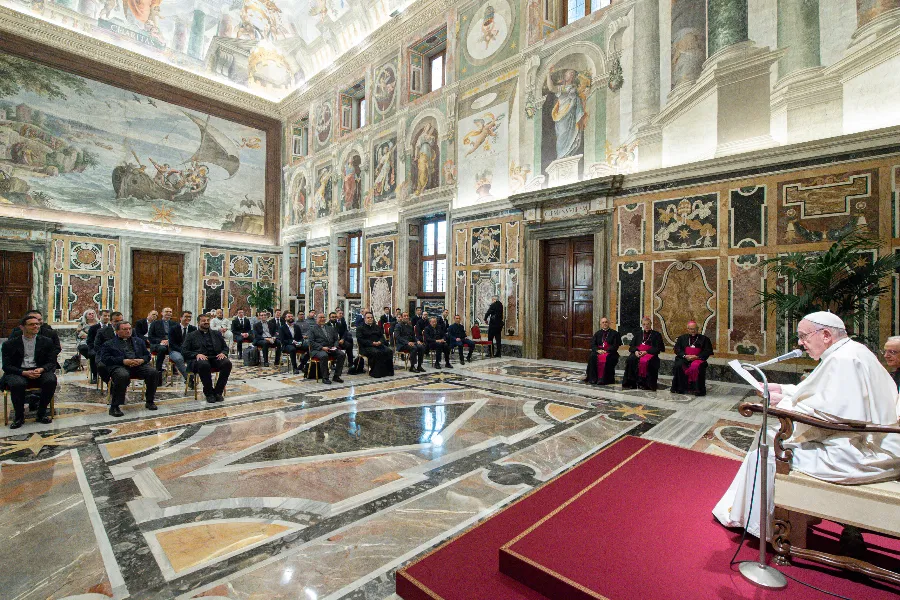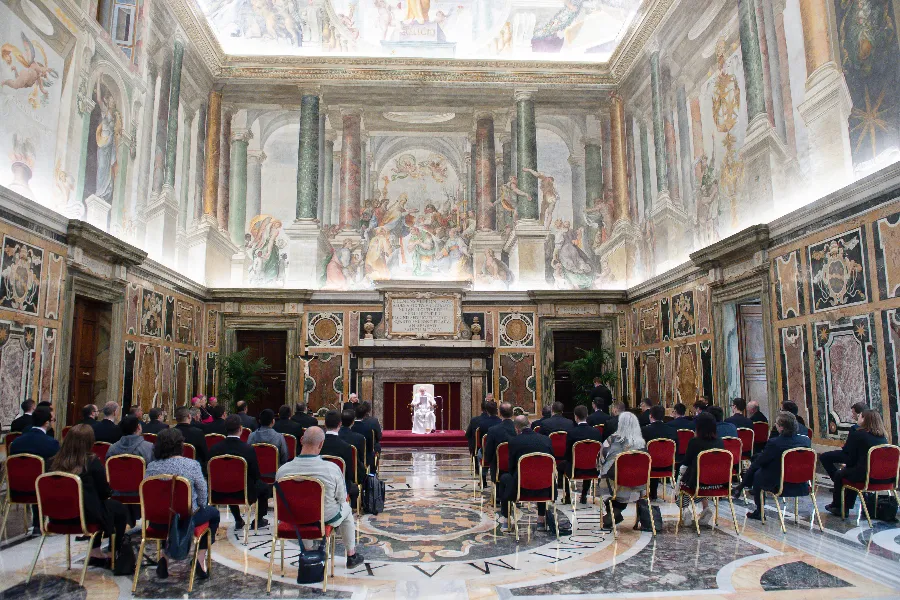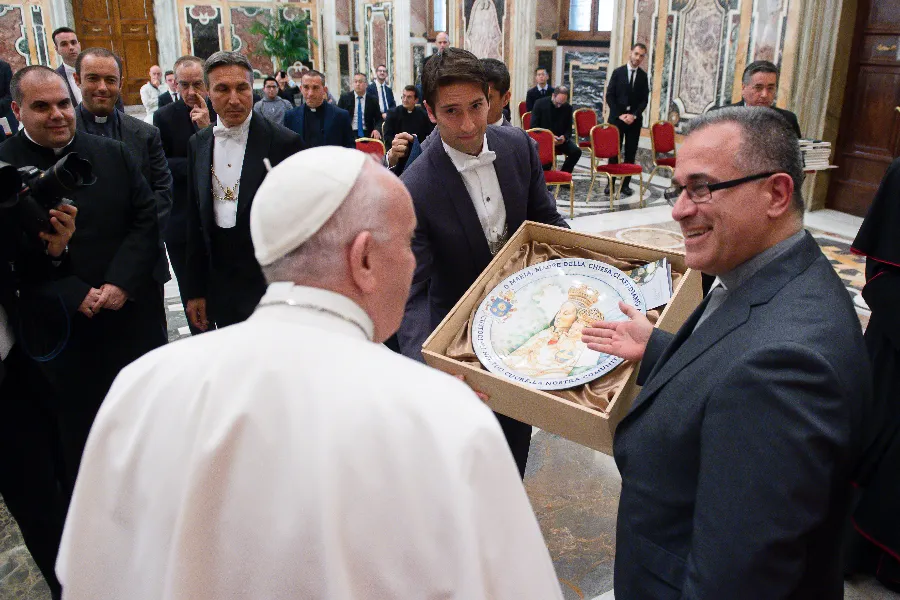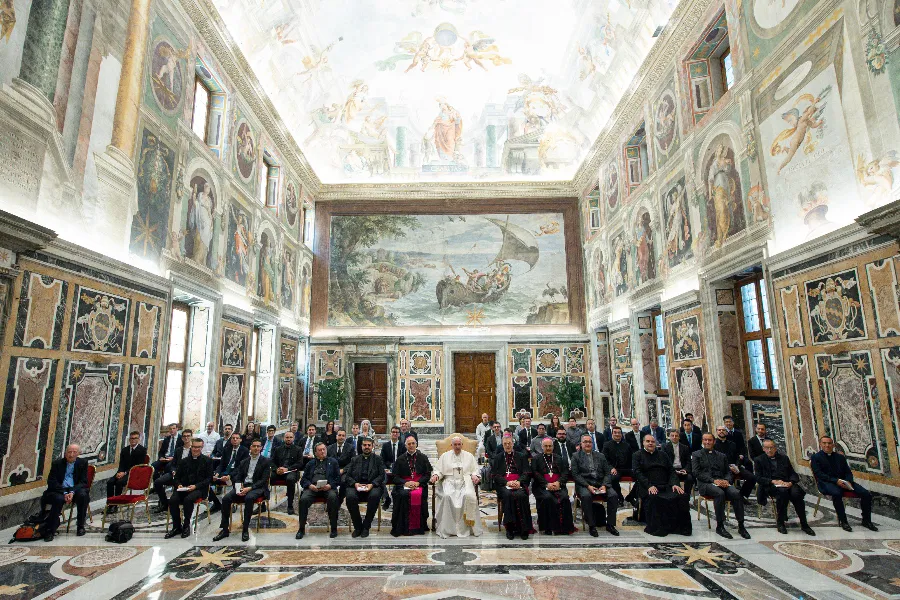
Pope Francis Thursday urged a group of Italian seminarians to avoid rigidity, which, he said, lacks humanity, and encouraged them to ask God for the gift of docility.
“Clericalism is a perversion of the priesthood: it is a perversion. And rigidity is one of the manifestations,” the pope said June 10.
“When I find a rigid seminarian or young priest, I say ‘something bad is happening to this one on the inside.’ Behind every rigidity, there is a serious problem, because rigidity lacks humanity.”

Francis spoke about the qualities of a good seminarian and priest in a meeting with the students, rector, and formators of the Pius XI regional pontifical seminary, located in Ancona, central Italy.
The seminary, he said, should not distance its students from reality, from dangers, and from others, “but, on the contrary, make you become closer to God and to your brothers.”
“Within the walls of the seminary, expand the boundaries of your heart — the expanded heart — extend them to the whole world,” he said, “be passionate about what ‘draws near,’ what ‘opens,’ what ‘brings together.’”

The pope also encouraged the seminarians to be steeped in the Word of God, not only internet chatter.
“Do not be satisfied with being skilled in the use of social media and digital media to communicate,” he advised. “Only transformed by the Word of God will you be able to communicate words of life.”
He said that “the world is thirsty for priests who are able to communicate the goodness of the Lord to those who have experienced sin and failure, for priests who are experts in humanity, for pastors willing to share the joys and labors of their brothers, for men who allow themselves to be changed by the cry of those who suffer.”

Pope Francis also said he liked to imagine seminaries as a kind of Holy Family of Nazareth, the place in which Jesus was “welcomed, guarded and formed in view of the mission entrusted to him by the Father.”
“The Son of God accepted to let himself be loved and guided by human parents, Mary and Joseph, teaching each of us that without docility no one can grow and mature,” he said.
Francis emphasized the importance of asking for the gift of docility, which he said “is a constructive attitude of one’s vocation and also of one’s personality.”
He also encouraged seminarians and young priests to speak to the old priests in their diocese, who, he said, are “the treasure of the Church.”
“So many of them are sometimes forgotten or in a retirement home: go and see them,” he urged.
Addressing the seminary’s rector, spiritual director, and formators, he asked them to be for their seminarians what St. Joseph was for Jesus.
“May they learn more from your life than from your words, as happened in the house of Nazareth, where Jesus was formed at the school of Joseph’s ‘creative courage,’” he said.

“May they learn docility from your obedience; industriousness from your dedication; generosity towards the poor from the testimony of your sobriety and availability; fatherhood thanks to your lively and chaste affection.”
Reflecting on St. Joseph’s chastity, Pope Francis explained the virtue of chastity as “freedom from possession in all areas of life.”
“Only when a love is chaste, is it truly love,” he said.
If you value the news and views Catholic World Report provides, please consider donating to support our efforts. Your contribution will help us continue to make CWR available to all readers worldwide for free, without a subscription. Thank you for your generosity!
Click here for more information on donating to CWR. Click here to sign up for our newsletter.



He doesn’t actually define “ridigity.” Would he, for example, have problems with the Curé of Ars, who could be quite rigid when dealing with sin? Would he have a problem with priests who actually follow the rubrics of the Mass instead of ignoring them? How about St. John Fisher, who didn’t obediently follow the Archbishop of Canterbury, Thomas Cranmer, into heresy, and was too rigid to knuckle under to Henry VIII’s split with Rome the way all the other bishops of England did?
F1, the pope whom history will judge to be not an anti-pope, but anti-Catholic
May we thank God that invertebrate priests–those who are not steadfast in faith and morals–are anything but “rigid.”
Docility?
Mercy and charity without justice are false.
No action or papal declarations on the German situation.
How long, Lord?
The problem with the Church is not rigid priests, but a flaccid Pope and Bishops.
As Leslie notes the Pontiff doesn’t identify rigidity. We’ve heard it frequently throughout his pontificate most often to seminarians and newly ordained. Nevertheless, we know [speaking for myself among others with a semblance of priestly perspicacity] exactly what he means by rigidity. That is the unwillingness to acknowledge and implement the principles of mitigating circumstances and primacy of conscience spelled out in Amoris Laetitia with the conclusion of footnote 351 to dispense the Eucharist to persons living in manifest adultery, or irregular unions outside the moral parameters of Catholic moral doctrine. Thereby providing comfort, a “remedy” to sinners giving God “the best they are capable of”, an erroneous proscription that neglects God’s grace, and sins against the Holy Spirit. A blasphemy against the Holy Eucharist [a judgment incurred upon themselves]. Pope Francis teaches a doctrine that places benefit of the doubt in favor of the unrepentant, and emotionally coerces the priest to submit in favor of the unrepentant. This doctrine affects the entire spectrum of moral doctrine, the deleterious effects already evident in Malta, Sicily, Germany, the Philippines elsewhere where bishops conferences decided they cannot implement Apostolic Tradition therefore permitting any decision solely up to the individual. Rigidity is the not so mysterious codeword for the unwillingness to be merciful. Although absent of justice. A rationale for Pope Francis to frequently repudiate the existence of eternal punishment that softens the conscience of presbyter and laity regarding serious sin and its eternal consequence. For him to call the faithful presbyter or bishop a Pharisee. A doctrine that removes the ability of the presbyter and bishop to save souls from the fires of Hell.
Should one scoff, laugh or cry at the following from the Pontiff?
“When I find a rigid seminarian or young priest, I say ‘something bad is happening to this one on the inside.’ Behind every rigidity, there is a serious problem, because rigidity lacks humanity.”
Again—-I say ‘something bad is happening to this one on the inside.’
“Who am I to judge”. The mark of “this one” are contradiction and ambiguity.
There, I did judge!
You are misimisinterpreting the pope just like those others who have when he said this the pope said if someone is seeking God with good will who am I to judge. In the context rigidity is a different story I don’t think the Pope is looking at the heart of the person (which he can’t no one except God can judge a person’s heart) but rather from his experience seeing that rigidity might in fact be an external manifestation of some type of internal struggle that makes one unopened to mercy and compassion. Which I think is a legitimate question for all of us to ask ourselves. Do we ever use the law to crush or hurt others rather than to strengthen and challenge? This is a question that I even have to ask myself. I am not denying the importance of the law, but do we ever fall into the trap of being self righteous by hiding behind it rather than let it transform us to the highest depth of the law which is love?
Amen! Amen.
One of the major roles of the Biblical prophets was the correction of deficient faith practices. Many of them could be called “rigorists”, or “rigid.” Being morally upright and righteous requires a strong backbone. Cain took great exception to Abel, and the mob took the same exception to St. Stephen. We all know what happened to Christ. In Christ’s woes about the killing of the prophets in Matthew 23 He specifically mentions crucifying and stoning. That would cover His and St. Stephen’s deaths. There are things that we want to hear, and there are things that we need to hear. The things that we need to hear are not always pleasant.
*
For a person who rebukes judging people, Pope Francis appears to be engaging in judging the seminarians. He has a long history of this kind of conduct. There is extensive documentation of Pope Francis’ papal put-downs on the website “The Pope Francis Little Book of Insults.” URL:
*
http://popefrancisbookofinsults.blogspot.com/
*
The quotes are clickable links to the articles where those quotes came from. It is quite the papal rock pile for him to verbally stone those he disagrees with. The more things change the more they stay the same.
May a bring to mind, in responding to Greg B, that Jesus in his ministry had a lot to say to the Pharasies regarding what could be described as rididity while missing the heart of the gospel message of Jesus.
My question is why the constant condemnation of our Pope Francis?
Christ never questioned the teachings of the Pharisees, He questioned their practice of the faith. The prophets that I referred to rebuked the people for their faithlessness. For their failure to live out the Mt. Sinai Covenant that they swore a solemn blood oath to. The prophets spoke to the very heart of the faith. The Catholic Church is based on Christ’s New Covenant ratified in His Own Blood. There are people who call themselves Catholics who behave little different than faithless Israel. Following the world and worldly ways that contradict Church teachings.
*
Pope Francis has a bad habit of making confusing public statements. There got to be a cottage industry in Popesplaining. Many Popesplainers have since given up Popesplaining.
Confusion and ambiguity are elements of dishonesty.
True Christopher. The Pharisees rigidly followed the letter of the Law but still lived like a brood of Vipers. They hated Jesus because his teachings made them uncomfortable. They were so comfortable following laws that they found him to be a hindrance, perhaps, accused him of being confusing.
Rigid Prelates, including the highest of prelates, setting about the deconstruction of the Deposit of Faith are a manifestation of clericalism.
The real question is why isn’t there even more constant condemnation of this pope?
“Taking, therefore, the words of Christ and of the Apostle [Paul] as the strict rule, should not one say that the Church of today is rather inclined more to indulgence than to severity? It so happens that the accusation of oppressive rigidity made against the Church by the ‘new morality,’ in reality, attacks, in the first place, the adorable Person of Christ Himself.”
Pius XII